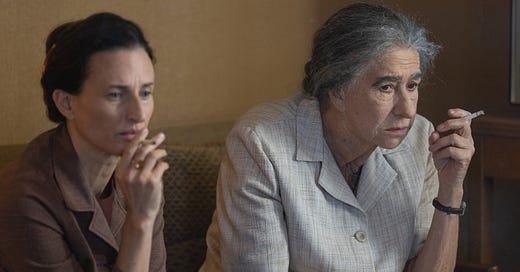"Golda" & The Politics of Omission
The most dangerous propaganda doesn’t just alter history — it elides it
“There was no such thing as Palestinians. It was not as though there was a Palestinian people… and we came and threw them out and took their country from them. They did not exist.”
These words were spoken in 1969 by Golda Meir, the fourth Prime Minister of Israel and the subject of Guy Nattiv’s recent biopic Golda, which explores Meir’s role and regrets in the October War, or the Yom Kippur War. Six years after the Israeli state began the occupation of the Sinai Peninsula and the Golan Heights, a coalition of Arab states, led by Egypt and Syria, launched an attack on Israeli forces on Yom Kippur in an attempt to reclaim occupied land after Israel had refused a treaty proposed by Egyptian president Anwar Sadat.
As Golda Meir (Helen Mirren, caked in prosthetics) hears the ticking clock of Israel’s military future in her ears, she is subsumed by guilt and must balance Israel’s nationalistic goals with growing pressure from Henry Kissigner (Liev Schreiber) to fight as an American proxy against the Soviets and keep oil prices low. Her internal conflict is reflected in spinning cameras and sickening clouds of digital smoke which weave in and out of her nightmares. These gratuitous and nauseating filmmaking techniques are some of few attempts to establish intriguing backstory and complexity for Meir and fail miserably in doing so. Her personal history is only otherwise introduced through undeveloped expository dialogue, resulting in uneven and unsatisfying development.
Throughout the movie, one of Meir’s primary objectives is not only Israeli military victory -- she also seeks the recognition of the Israeli state by neighboring Arab nations. When President Sadat finally mentions Israel by name in one of his speeches, the film frames it as an unequivocal victory. What director Guy Nattiv attempts is subtle but insidious -- he reframes the story from a military conflict to an identity-based conflict, and tries to skew the viewer’s biases to the side of Meir and Israel. It is difficult to make Israel look righteous in war, but is an easier task to frame the state as morally upright if the film defines Israel’s mission as a quest for the legitimacy of its people.
At this point, a viewer might begin to notice the complete omission of a central reality of Israeli history: Palestine. The word “Palestine” is completely missing from the film. Granted, Palestine was not militarily involved in the October War, but the war was directly and intrinsically related to Israel’s ongoing occupation of Palestine and other Arab regions. To elide Palestine entirely, and to instead focus on a quest for Israeli legitimacy, submits directly to the heart of Golda Meir’s politics.
Meir is most well-remembered among pro-Palestinian activists as an abject denier of Palestinian existence. She believed firmly in the supremacy of European Jews in Israel, saying non-white Jews were “unelevated” in comparison to Ashkenazim, and singlehanded played one of the largest roles in institutionalizing Palestinian apartheid of any Israeli Prime Minister. When Golda totally omits Palestine, it endorses its protagonist’s politics through active ignorance. One of the most effective tools of propaganda, more effective than de-humanizing one's enemies or re-writing history, is to simply ignore their existence and omit them entirely.
OVERALL SCORE: 3/10
Golda was released on August 25 and is currently playing in US theaters.





. . . you can't really understand without understanding the math. The stories are just illustrative; they're like, fables, say, to help give you a picture. I mean - even I don't understand the dead cat.